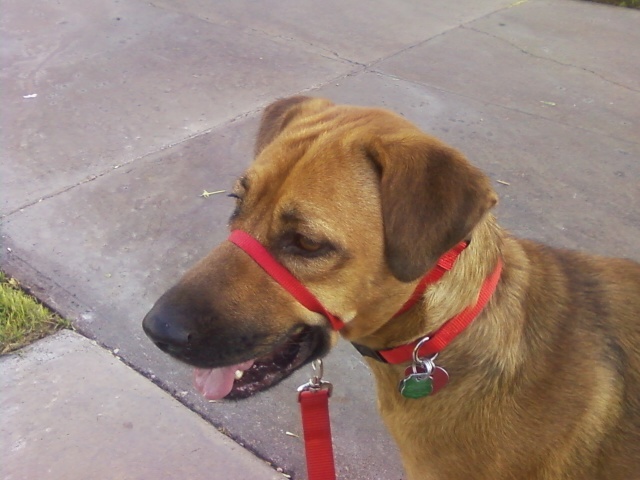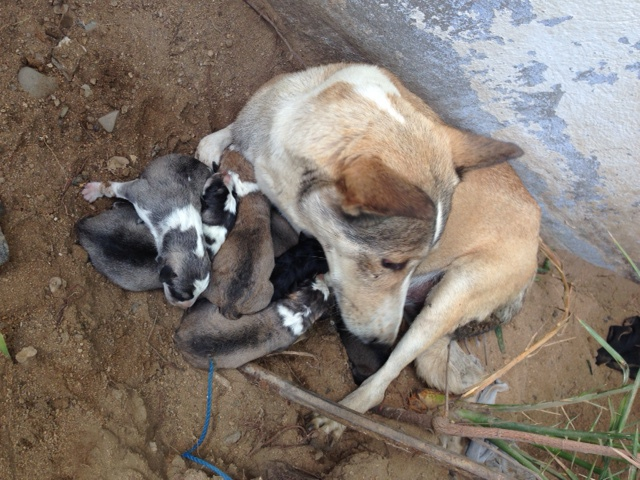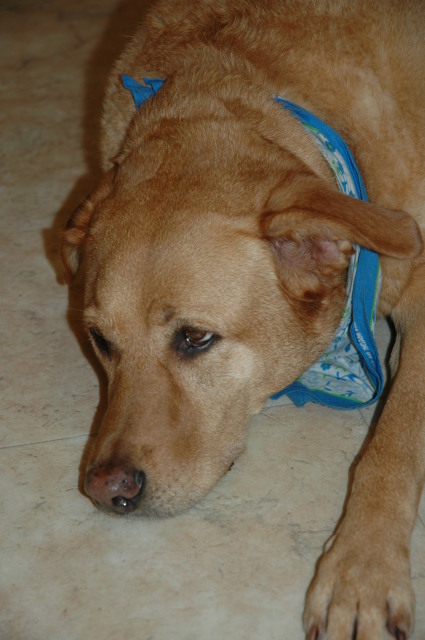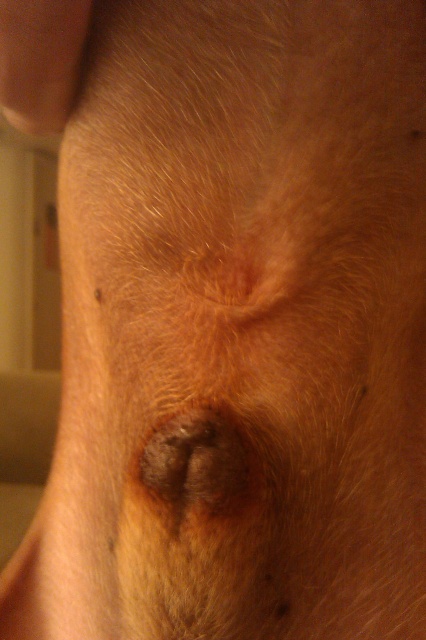QuestionWe adopted a female rat terrier mix from a shelter at 6 weeks old. She responded to housebreaking slower than our other dogs but had it down within two weeks with us. She is now almost seven months old and last week had two "accidents". The first time she jumped in our bed, where she sleeps, and immediately peed on the covers. There was nothing unusual going on at the time, just getting into bed for the night. The second incident happened when she was running around greeting my husband who had just returned from work. She squatted and peed on the floor. Both times she had been outside less than an hour before. She had worms and mites when we got her, but those problems cleared up quickly. She has been spayed, gets lots of good food (Innova), exercise, love and attention. She gets along well with her two "sisters". She's a happy puppy and has had a medical checkup. We initially considered a urinary tract infection but she is still able to make it through the night (usually about 8 hrs) with no problem. Any ideas as to what might be causing this and how should I respond to it? I have returned to the practice of taking her outside much more frequently as I did when we first brought her home. I feel like I am starting housebreaking all over again. Thanks.
AnswerThe key to most behavior problems is approaching things using the dog's natural instincts. Dogs see all the people and dogs in the household as a pack with each having their own rank in the pack and a top dog. Life is much easier if the 2 legged pack members outrank the 4 legged ones. You can learn to play the role of top dog by reading some books or going to a good obedience class. A good obedience class or book is about you being top dog, not about rewarding standard commands with a treat. Start at http://www.dogsbestfriend.com/ For more on being top dog, see http://www.dogbreedinfo.com./topdogrules.htm
Dogs frequently begin marking in the house as they mature as a challenge for pack status. Spaying usually helps, but as this case proves, it is no cure all.
You need to keep her in sight at all times and be ready with a sharp ''Ut, ut. ut!'' Use gates or closed doors to keep her in the same room as you. When nobody can watch her, crate her.
It is only natural that a puppy resists its crate at first. What the puppy
wants more than anything else is to be others, you, anyone else in the
household, and any other pets. In our modern society, even if we are home,
other things distract us from the attention an uncrated puppy must have. The
only real solution is to crate the dog when you aren't around. The dog may be
happier in its den than loose in the house. It relaxes, it feels safe in its
den. It rests, the body slows down reducing the need for water and relieving
its self. Dogs that have been crated all along do very well. Many of them
will rest in their crates even when the door is open. I think the plastic
ones give the dog more of a safe, enclosed den feeling. Metal ones can be put
in a corner or covered with something the dog can't pull in and chew. Select
a crate just big enough for the full grown dog to stretch out in.
Leave it some toys. Perhaps a Kong filled with peanut butter. Don't leave
anything in the crate the dog might chew up. It will do fine without even any
bedding. You will come home to a safe dog and a house you can enjoy.
A dog that has not been crated since it was little, may take some work.
Start out just putting its toys and treats in the crate. Praise it for going
in. Feed it in the crate. This is also an easy way to maintain order at
feeding time for more than one dog.
The "shut the puppy in a safe room" is a fallacy. Very few houses even have a
safe room. How many of us have a room with a hard surfaced floor and nothing
else? Most rooms have electrical cords to chew if nothing else. In addition
to destroying anything a bored puppy finds to chew, it may choke or have
intestinal blockage from the pieces. I had a friend that left her dog in a
"safe" room. It ate a hole in the floor covering. The safe rooms fail to
give the dog the comfort of the enclosed space their instinct requires. Nor
do they restrict activity extending the time the dog can go without relieving
itself.

 My dog Kiya
Question
Kiya
My new dog Kiya is a 2 yr old German Shep
My dog Kiya
Question
Kiya
My new dog Kiya is a 2 yr old German Shep
 Whats the dog type?
Question
1 2
Dear ma`am,
Me and my friend
Whats the dog type?
Question
1 2
Dear ma`am,
Me and my friend
 Senior dog not eating
Question
Meggie Girl
I will be so grateful if you can h
Senior dog not eating
Question
Meggie Girl
I will be so grateful if you can h
 Found Dog
Question
this is what it looks
Hello my is sara and my
Found Dog
Question
this is what it looks
Hello my is sara and my
 maltese with brown ears
Question
maltese
we bought a dog and owner said its pur
maltese with brown ears
Question
maltese
we bought a dog and owner said its pur